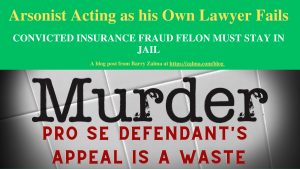Arsonist Acting as his Own Lawyer Fails

See the full video at https://rumble.com/v2dkckk-arsonist-acting-as-his-own-lawyer-fails.html and at https://youtu.be/4moG6M9DkK0
Charles Moss, a federal inmate proceeding pro se, appealed the district court’s dismissal of his habeas corpus petition for lack of statutory jurisdiction. In Charles Moss v. D. Jones, Acting Warden, No. 22-1210, United States Court of Appeals, Tenth Circuit (February 21, 2023) the Tenth Circuit gave respect to a pro se appellant and showed he failed in his attempt to get out of jail.
BACKGROUND
Moss played a role in separate insurance fraud schemes that culminated in arson, murder, and the destruction of a van used in the killing. A federal jury in Louisiana convicted Moss “of conspiracy to commit mail and wire fraud, . . use of fire to commit obstruction of justice in relation to the van fire[,] . . . [and] use of fire to commit mail fraud in relation to [a] house fire.”
Moss appealed and the Fifth Circuit rejected his arguments. Moss, among other things, then argued actual innocence based on newly discovered evidence and an intervening change in law. The court denied the motion.
The magistrate judge recommended dismissing the petition for lack of statutory jurisdiction noting that the so-called “savings clause” permits a federal prisoner to proceed only when the remedy under the statute is inadequate or ineffective to test the legality of his detention. The Magistrate concluded that Moss failed to demonstrate that the remedy available to him in the sentencing court was inadequate or ineffective and warned Moss about the hazards he faced if he did not promptly respond.
Waiver
Under the Tenth Circuit’s firm waiver rule, the failure to timely object to a magistrate judge’s finding and recommendations waives appellate review of both factual and legal questions. There are two exceptions to the rule when:
a pro se litigant has not been informed of the time period for objecting and the consequences for failing to object, or when
the interests of justice require review.
Factors relevant to the second exception include a pro se litigant’s effort to comply with the objection requirement, the force and plausibility of the explanation for his failure to comply, and the importance of the issues raised.
The first exception does not apply because the magistrate judge informed Moss of the time period for objecting and warned him of the consequences attendant to his failure to object.
Regarding the second exception, Moss does not assert he made any effort to comply with the objection requirement or offer any excuse for his failure to make such an effort. He instead argued the court should apply the interests of justice exception to the firm waiver rule because the district court plainly erred in dismissing his § 2241 habeas corpus petition. The Tenth Circuit rejected this argument.
Moss did not meet his burden to show that the remedy provided by the statutes was inadequate or ineffective. While he argued that his conviction lacked legal sufficiency, a showing of actual innocence is irrelevant to the savings clause inquiry. Under the Tenth Circuit’s firm waiver rule Moss waived any challenge to the magistrate judge’s factual findings or legal determinations by failing to object to them and the district court’s judgment was affirmed.
Criminals, by definition, have little or no respect for the law. After being convicted of the serious crimes of insurance fraud schemes that resulted in arson and murder, Moss refused to accept the punishment for his vicious crimes and failed in his first appeal and then filed a habeas corpus action which was given respect it did not deserve, and he is still in jail and has the right to appeal further even though he has no chance of success. Moss, therefore, continues his criminal activity by abusing the judicial system requiring it to give respect to his appeals.
 (c) 2023 Barry Zalma & ClaimSchool, Inc.
(c) 2023 Barry Zalma & ClaimSchool, Inc.
Subscribe and receive videos limited to subscribers of Excellence in Claims Handling at locals.com https://zalmaoninsurance.locals.com/subscribe.
Consider subscribing to my publications at substack at https://barryzalma.substack.com/publish/post/107007808
Barry Zalma, Esq., CFE, now limits his practice to service as an insurance consultant specializing in insurance coverage, insurance claims handling, insurance bad faith and insurance fraud almost equally for insurers and policyholders. He practiced law in California for more than 44 years as an insurance coverage and claims handling lawyer and more than 54 years in the insurance business. He is available at http://www.zalma.com and zalma@zalma.com
Follow me on LinkedIn: www.linkedin.com/comm/mynetwork/discovery-see-all?usecase=PEOPLE_FOLLOWS&followMember=barry-zalma-esq-cfe-a6b5257
Write to Mr. Zalma at zalma@zalma.com; http://www.zalma.com; http://zalma.com/blog; daily articles are published at https://zalma.substack.com. Go to the podcast Zalma On Insurance at https://anchor.fm/barry-zalma; Follow Mr. Zalma on Twitter at https://twitter.com/bzalma; Go to Barry Zalma videos at Rumble.com at https://rumble.com/c/c-262921; Go to Barry Zalma on YouTube- https://www.youtube.com/channel/UCysiZklEtxZsSF9DfC0Expg; Go to the Insurance Claims Library – https://zalma.com/blog/insurance-claims-library.
Like this:
Loading…
Related
About Barry Zalma
An insurance coverage and claims handling author, consultant and expert witness with more than 48 years of practical and court room experience.







